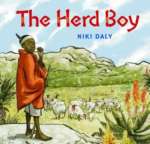
The Herd Boy
Written by Niki Daly
Eerdmans Books for Young Readers, 2012, n.p.
ISBN: 978-0802854179
You have to be awake, and you have to be brave, to be a herd boy. (n.p.)
South African author-illustrator Niki Daly shows readers a day in the life of Malusi, a young boy who cares for his grandfather’s sheep and goats. He awakens early to guide them up to the grazing slopes, watching out for poisonous snakes resting in the bushes. This young boy observes and interacts with the natural world. He notices the hard-working termites that march in two columns. He collects dung to be used by the shopkeeper in his garden; dung that the family will trade for fresh vegetables.
Malusi also makes time to play with his friend and fellow herder Lugisa who is a champion footballer (soccer player) and stick-fighter. The boys talk about what they want to be when they grow up. Lugisa wants to play football for a famous team. Malusi wants to be the president, which makes his friend laugh and laugh. How can a herd boy grow up to be a leader in his country?
While the animals graze, Malusi protects them from the troop of baboons that threaten the flock. When a baboon attacks one of grandfather’s lambs, Lugisa’s dog chases away the attacker. Still the lamb is injured, and Malusi must carry it down the slopes in hopes that grandfather’s medicine can save it.
At the end of the day, the boys sing to quiet their hunger on their journey home until a shiny new car, kicking up dust, stops beside them. The man in the back seat opens the window and greets the boys. This man tells them he was once a herd boy, too, and asks the boys of their future aspirations. The man notes that “a boy who looks after his herd will make a very fine leader” (n.p.). Readers are treated to a satisfying ending when we learn that the lamb will survive. Grandfather also gives Malusi a puppy that will grow up to help him protect the sheep. The young herd boy fails asleep with the puppy in his arms and dreams of his future election.
In his illustrations, Niki Daly captures the people, culture, and landscape of South Africa. He adds defining black outlines to his watercolor paintings and uses spot art to connect readers with textual references and events not depicted in the larger illustrations. The book includes a glossary with pronunciation guides of Afrikaans and Xhosa words. The use of these words throughout the story contextualizes it within South African culture and adds a strong element of cultural authenticity.
In his author’s note, Niki Daly confirms that the man in the car was none other than former South African President Nelson Rolihlahla Mandela. Mr. Mandela, who spent twenty-seven years as a prisoner under apartheid, negotiated an end to white rule. He was elected president in 1994 in the first election in which all South Africans, regardless of race, were allowed to vote.
After reading The Herd Boy, the picture book biography Mandela: From the Life of the South African Statesman written and illustrated by Floyd Cooper (Philomel, 1996) provides an extension of this story. This book spans Nelson Mandela’s life from herd boy to South African president and will provide young readers with another view of South African culture as well as political history. They can also compare and contrast the mood created by Floyd Cooper’s oil wash on board illustrations as compared with Niki Daly’s watercolors.
Niki Daly ends his author’s note with this question, “What is there in the life of a herd boy that would help prepare him to become the shepherd of a nation?” This is a question that young readers may want to explore. As Daly notes, Mr. Mandela’s humble beginnings mirror those of Old Testament David, a shepherd during childhood who grew up to be a king, and Muhammad, the Islamic prophet, who also tended his family’s herd. In U.S. society, people such as Benjamin Franklin, Abraham Lincoln, Rosa Parks, and Bill Clinton all came from humble beginnings to become leaders who made a difference in the lives of others.
A thought-provoking contrast could be to think about the life choices of some people who are born in privilege and choose a humble lifestyle as emblematic of their beliefs and social or political action. Mahatma Gandhi is one example. Creating a text set of picture book biographies is one way to inspire readers to explore some of these questions about character traits, life skills, and life choices.
Judi Moreillon, School of Library and Information Studies, Texas Woman’s University, Denton, TX
WOW Review, Volume VI, Issue 1 by Worlds of Words is licensed under a Creative Commons Attribution-NonCommercial-ShareAlike 4.0 International License. Based on work at https://wowlit.org/on-line-publications/review/vi-1/

Dear Ms. Wilson,
I would be grateful for some details – which are the facts that I neglected to look up, specifically on Wikipedia?
The novel was written in 2005 and I consulted countless books and other media in order to describe two Jewish families in the 1930s and 1940s as credibly as possible. A good deal of the two years of writing this novel (the German original being much longer than the American edition) was spent on research in Berlin and London. Before going into print, the finished novel was read and approved by two scholars with a degree in Judaism. One of them spent most of her life in Israel.
I am very sorry for any mistake which remained in the book, also for maybe not quite catching the spirit of being Jewish in Britain in the 1940s.
With best wishes,
Anne Voorhoeve